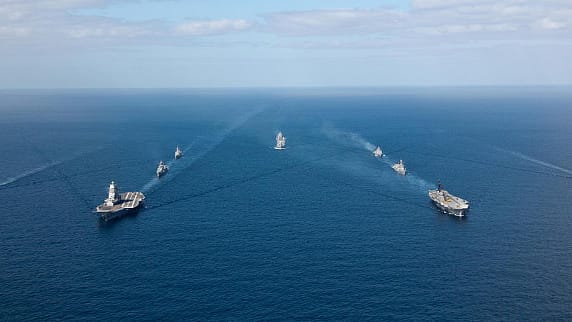India Inc. should watch the storm brewing in the Indian Ocean
ADVERTISEMENT

What are businesses most waylaid by? Things that they have never planned for. So, these days what is that black swan event that Indian businesses should be tracking but are not?
The Indian Ocean. What’s happening there? The news consistently talks about India’s foreign policy of bringing the Indian Ocean to the forefront of its foreign policy. I have written about India’s Necklace of Diamonds strategy which has the Indian Ocean as a cornerstone too.
Prime Minister Narendra Modi announced in November 2018 the completion of India’s nuclear triad with the patrol of the nuclear-powered ballistic missile carrying-capable INS Arihant. While the exact strike status of Arihant is being debated, what it has triggered, at least from the Pakistani point of view, is that worries of a destabilising balance of power is rising in the Indian Ocean between India and Pakistan.
Why would this be true and why is this rarely ever mentioned in Indian reportage?
Because most of the writing on this issue follows two streams. The first is what is often known as a cascade effect in strategic studies – this simply means, while India considers China to be its main rival, the Chinese are barely concerned about India, and keep their eyes firmly on America, and in the meantime, while India is reluctant to consider Pakistan its key foe, for the Pakistanis, the aim is always India. So, there is a lot of writing in India about competing Indian and Chinese interests in the Indian Ocean but little about the developing storm clouds in the India-Pakistan dynamic in the same waters. The second reason is that the India-Pakistan conflict is so heavily dominated by Kashmir that other fields of friction get swamped by that noise.
But I would argue Indian business is far more – or ought to be far more – interested in what’s happening in the Indian Ocean. Pakistan is, in fact, as interested in the Indian Ocean as India and China are – 95% of its trade goes through these waters. And now with the Arihant patrol, India’s nuclear-armed neighbour believes that the balance of power between the two navies has been disrupted.
Already the Pakistanis have been worrying that India’s Necklace of Diamonds strategy is tying up a series of critical security relationships offering trade and strategic support to win everything from favourable agreements to military bases, from Seychelles and Mauritius to Sri Lanka, and now the nuclear submarine tilts the balance dangerously towards India.
So, what does Pakistan want? It wants to take remedial measures to restore the balance of power. It believes that the situation is dangerously moving towards limited war with India.
Resource-starved Pakistan does not have, at the moment, to immediately gather weaponry that would, in their eyes, adequately rebalance the situation. This, in its opinion, means that strategically there is less incentive for India today to shy away from a potential conflict. After the idea of deterrence is that the balance of power should be so poised that both parties should be deterred from choosing the path of war. This stability has been disturbed, believe the Pakistanis, in the Indian Ocean. So the question the Pakistanis would be asking is this - what makes sense in this situation, strike first or wait for India to strike to which we might not have the right response? This is not a good question to linger between the two countries.
A hint of Pakistani apprehension of course can be smelled in recent Chinese suggestions that irrespective of the thaw between Modi and Chinese President Xi Jinping, China will continue to block India’s entry into the Nuclear Suppliers Group.
For some time now, there has been a Pakistani belief that talks with India can only resume if Narendra Modi loses power in the elections later in the year, because of Prime Minister Modi’s strong stance against talks without substantial improvement on terror issues in Kashmir. To counter this, Prime Minister Imran Khan has been pitching his efforts, including the opening of the Kartarpur Corridor, as symbols of goodwill. But the Indian security establishment has been wary of taking any of this at face value.
That the Pakistani military establishment and indeed the political establishment believes that if Modi is replaced after the 2019 elections, then talks would happen, is no secret. Pakistani strategists and politicians openly talk about this. Of course, equally stridently many in India’s strategic community back Modi’s strong stance against the talks for talks-sake viewpoint.
In such a scenario, there is one theatre where the chances of Indian and Pakistani arsenal clashing are more likely than any other – the Indian Ocean. But India Inc. would have to look beyond the relentless clamour on Kashmir to recognise that.